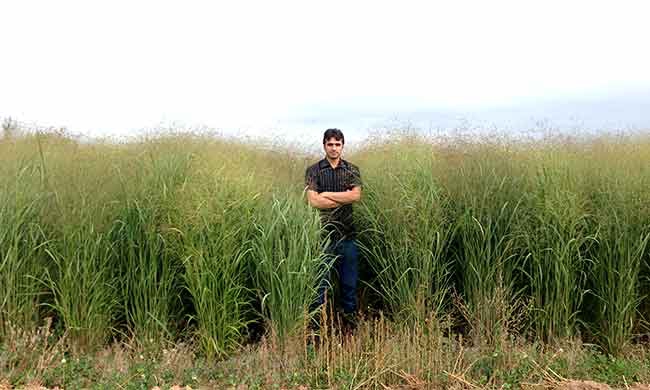
Features
Heating
Structures & Equipment
Smoother, Faster, Cheaper
BioFuelNet is working to improve the steps in the bioproduct supply chain
July 11, 2016 By Gabrielle Bauer BioFuelNet
 A BioFuelNet Highly Qualified Personnel (HQP) team member working on a feedstock project. Photo Courtesy Biofuelnet
A BioFuelNet Highly Qualified Personnel (HQP) team member working on a feedstock project. Photo Courtesy BiofuelnetAugust 2016 – Murphy’s law states that if anything can possibly go wrong, it will. This may be why the biofuel supply chain – a complex sequence with numerous hurdles – has been identified as a key barrier to the development of a bioproduct industry in Canada.
It’s a barrier that BioFuelNet’s low-cost sustainable feedstock (LCSF) Task Force is determined to break.
“When people interested in running bio-
refineries talk to us, one of their first questions is whether they can obtain enough feedstock of the type they need and get it to their facilities at a price that makes sense,” says Dr. Kevin Vessey, dean and associate vice-president of research at St. Mary’s University in Halifax and head of the task force’s major initiative, called “animating the Canadian biomass feedstock supply.”
The initiative will focus on a short list of emerging supply chain projects (“case studies”) throughout Canada.
Task force members will bring their collective expertise to bear on these projects, laying the groundwork for supply chains that make logistical and economic sense.
First decision point: What feedstock to use?
It turns out that trees may have distinct advantages. “They’re an underutilized resource that can help biorefiners increase their supply of raw materials,” says Vessey, citing hybrid poplar and willow as examples. “There’s no shortage of land on which to grow them.”
Next challenge: how to cultivate the trees to maximize biomass yield.
To date, research favours “coppicing,” an approach traditionally used with shrubs.
Then there’s the problem of transporting the stuff. Dr. Houman Fei, who works with Vessey on the task force, puts it plainly: “Biomass is heavy. It’s been shown that the business case for biorefineries depends on the biomass being within 100 kilometres of the facility.”
Fortunately, some bioenergy stakeholders are willing and eager to overcome these hurdles. A case in point: The government of Nova Scotia recently approached BioFuelNet for guidance in setting up a biorefinery in the province, with crown corporation Innovacorp taking the lead on the ask.
Once provincial decision-makers settle on a site, they can draw on the task force’s expertise in transportation logistics. Questions to address include:
- How best to contain transportation distance?
- What mode of transportation works best across the short distances required?
The biomass itself will get a boost from seaweed extract, a growth promoter that BFN researchers have found useful in enhancing the yield of trees and grasses. Acadian Seaplants, a Dartmouth, N.S., manufacturer of marine plant products, will be providing the extract.
Looking further ahead, the task force has its sights set on a developing case in the rural North. Helping these communities squeeze the juice out of their natural resources would not only cut out waste, but generate jobs and expertise in a burgeoning field, says Vessey.
The end-game in all these efforts?
“Increasing supply chain efficiencies and reducing economic risk to the point where jurisdictions of all sizes can set up biorefineries – that’s what we mean by animating the supply chain.”
BioFuelNet Canada (BFN) is an integrated community of academic researchers, industry partners and government representatives who engage in collaborative initiatives to accelerate the development of sustainable advanced biofuels. BFN’s research is funded through a mix of government and private contributions, and is structured around the themes of feedstock, conversion, utilization, and social, economic and environmental sustainability.
Print this page